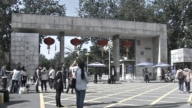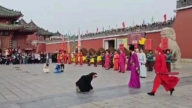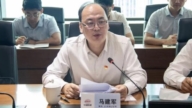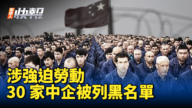【新唐人2012年2月1日讯】最近,英国《每日邮报》揭露,中国大陆存在一个鲜为人知的“黑领”阶层。他们通常身穿黑色套装,乘坐黑色豪华轿车,收入隐秘却控制着全国的经济和社会命脉。下面请看本台记者的报导。
1月29号《每日邮报》刊出的这篇文章,援引美国智库“布鲁金斯研究所”( Brookings Institution)的调查报告指出,这些黑领控制着中国大陆最重要的各个经济和社会领域,有的是大型国企老总、银行行长,有的已经成为省长、部长。
这些“黑领”们掌控着巨额财富和资源,贪污腐败极其严重。作为中共专制体制的受益者,他们竭尽所能的维护着特权和自己的既得利益。
文章列出了10个被认为是中国最有势力的“黑领”人物。
中共中央政治局常委、政法委书记周永康,曾任中石油集团总经理、公安部长,被列为是黑领的代表人物。 《维基解密》曝光的电文显示,周永康和同伙瓜分着中国的石油利益。他曾经为石油交易而14次前往非洲产油国苏丹。
其他被列入10大黑领的还有:中国电力董事长李小琳﹔电讯巨头——中国移动董事长王建宙﹔原中石化总经理、现任福建省长苏树林﹔前“一汽集团”总经理、现任吉林省委常委竺延风﹔中国商用飞机原董事长、现任河北省长张庆伟。
金融业也是黑领一族的集中地带,国家开发银行董事长陈元、中国银行及中银香港董事长肖钢、中国证监会主席郭树清,都榜上有名。他们不仅控制着国内财产,也控制着中共转移到海外的部分资产。
此外,负责生产武器的“中国兵器工业集团”总经理张国清,也被认为是黑领的代表人物。
经济时政评论家草庵居士:“从现在看公布的这些所谓的中国10大黑领阶层人物,他们几乎每一个人都是有从商、从政的经历,而且他们几乎都是掌握着国家的权力去经商,几乎也是各个垄断国有资产的代表。”
草庵居士指出,这些黑领的发家史都和政府、和独裁专制有相当大的联系,都有官方背景。
草庵居士:“当他们拥有政府官员背景的时候,在经商的时候,就往往能够获取更多的经济财富。然后,他又通过这个经济财富去影响政策的执行。他们的身份既是官员,又是商人。”
大陆经济学家綦彦臣也向记者表示,国企的扩张压缩了民营企业的生存空间,这在经济上是一种退步。他分析说,当局利用国企进行全球经济扩张,使国企拥有了更大的经济和政治利益,很多国企董事长陆续出任省长等高官。
綦彦臣:“中国政治,我们从技术层面讲,它绝对不是选举政治。它是一种委派政治。国家(政府)觉得哪一部分有用,就把权力分配给哪一部分。”
草庵居士也指出,隐藏在“黑领”阶层控制国家权力之后的,是中共专制体制对民众的横征暴敛、对民众权益的不断侵犯。要改变这个状况,必须进行政治变革,让人民拥有投票权、选举权。
新唐人记者周玉林、李谦、王明宇采访报导。
———————-
British Media Exposed China’s Ten Most Powerful “Black Collars"
Recently, the British “Daily Mail" unveiled a little-known class
in China known as the “black collar” class.
These people usually dress in black suits, ride in black
limousines, have a secret income but control the national economy and society’s lifelines.
The Daily Mail article, which was published on January 29th,
cited a report from the U.S. think tank, Brookings Institute.
It said that the black-collars control the most important
economic and social aspects in mainland China.
Some of them are chiefs of large state-owned enterprises,
some are presidents of banks, and some have become a provincial governor or minister.
Black-collars control a huge amount of wealth and resources.
They are extremely corrupt.
As beneficiaries of the Chinese dictatorship, they do everything
in their power to maintain their privileges and benefits.
The article lists whom they consider to be the 10 most
powerful black-collars.
Zhou Yongkang, who is a member of the Chinese Communist
Party’s (CCP) Central Politburo, the chairman of CCP’s
Politics and Law Committee, the former general manager of
China National Petroleum Corporation (CNPC) and
the former minister of Public Security, is listed as
a representative of the black-collars.
Wikileaks unveiled that Zhou Yongkang divides the profits
from China’s oil industry with other associates.
He went to Sudan, an oil producing country, 14 times for
oil trade.
The other nine are Li Xiaolin, the chairman of
China Power;
Wang Jianzhou, the chairman of the board
of China Mobile, the telecom giant;
Su Shulin, the current governor of Fujian province and
former chairman of the board of China Petroleum and Chemical Corporation Limited (SINOPEC);
Zhu Yanfeng, a current member of Jilin province standing
committee and former general manager of FAW Group;
Zhang Qingwei, the current governor of Hebei province
and former chairman of the board of Commercial Aircraft Corporation of China (COMAC).
Black-collars also hail from the financial industry.
Chen Yuan, the chairman of the board of National
Development Bank, Xiao Gang, the chairman of the board of
Bank of China and BoC HongKong, and Guo Shuqing,
chairman of China Securities Regulatory Commission are on the list.
They control not only domestic property, but also overseas
assets transferred from China by the CCP.
In addition, Zhang Guoqing, the general manager of the
Chinese weapon producer “China North Industries Group”, is also on the list.
Cao’an Jushi, a political and economic issues commentator:
“Looking at the so-called China’s 10 most powerful
black-collars, each one of them has experience in
business and politics.
And all of them do business with the political power, and
almost all of them are representatives of state-owned assets.”
Cao’an Jushi pointed out that the black-collars’ history of
wealth is tied into their strong relationship with the dictatorship,
and all of them have an official background.
Cao’an Jushi: “When they have a CCP official background,
they will acquire more fortune during business transactions.
Then, they use the obtained fortune to impact the execution
of policies. They are officials and businessmen.”
Qi Yanchen, a Chinese economist told NTD that the
expansion of state-owned enterprises has occupied the
grounds of private enterprises, which has caused a
backwards economy.
His analysis shows that the authority uses state-owned
enterprises to expand their business into the global market,
which benefits state-owned enterprises both economically and
politically.
Many chairmen of state-owned enterprises were appointed
governors of provinces.
Qi Yanchen: “From a technical level, China’s politics are
definitely not electoral politics.
It is appointed politics; central government leaders share
power with those who they will benefit from.”
Cao’an Jushi also pointed out that behind the black-collars
is the CCP dictatorship’s exactions and continuous human rights violations.
To change this situation, China must have political reform,
so as to give voting rights to the people.
NTD Reporters: Zhou Yulin, Li Qian and Wang Mingyu




























